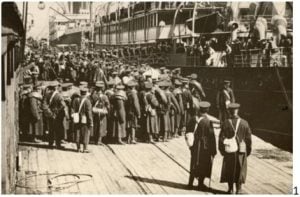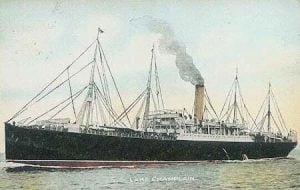By Padre Michael Peterson
To mark the centennial of the First World War, the AMO Newsletter continues a series of vignettes of Canada’s Anglican chaplains and their ministry throughout that conflict. Each instalment in the series will recall a time one hundred years prior to the writing of each Newsletter.
Once Canada raised the first elements of the Army it would send to Europe, the next task was to get them from Valcartier to staging and training camps in England. It took the last week of September 1914 to embark over 30,000 men and women (Nursing Sisters were included in the First Contingent) and 7,500 horses, plus artillery and horse-drawn and motor vehicles, into nearly forty merchant vessels. There were not enough trained stevedores in Quebec City, and as one officer described it, “chaos reigned supreme”, but the troops took charge of the job, the Contingent was loaded, and the last ships departed from Quebec on October 1st.

Canon Scott describes the crossing as a time of good weather and high spirits, but he got friendly with the ship’s telegraphers, and learned of ominous reports, such as the German capture of Antwerp, which suggested that the way ahead would be a hard one. Scott recalled that thoughts of perils to come “gave everyone on board a special sacredness in my eyes, and one felt strangely inadequate and unworthy to be with them”. Chaplains conducted evening services ending with the national anthem and patriotic speeches, and organized recreational events, but found that busy training schedules continued even on Sunday. As Duff Crerar notes in Padres in No-Mans Land, those chaplains who took a “censorious attitude” to activity on the Sabbath during the crossing did not make good impressions.

One of the Anglicans crossing the Atlantic that October was Major Charles Frederick Piper. A native of Hamilton, Piper was old for a chaplain, having enlisted at age 56. Most likely he was chosen for employment because of his prewar experience in militia chaplaincy. He left service in the Diocese of Niagara, where his ministry included St. Luke’s, Smithville, and other parishes. He was served the Fourth Canadian Infantry Battalion of the CEF, which had been formed from volunteers from the Hamilton and Brantford areas. The 4th CIB came over on the SS Tyrolia, a Canadian Pacific Line steamer. Piper’s new flock followed a demanding schedule. The 4th’s War Diary describes a typical day on the Tyrolia as follows. “They were up at 6 a.m., breakfast at 7 a.m., and while the men ate the officers exercised. At 9:10 a.m. was parade followed by Officer’s Signalling Class. Lunch was served at 11:45 a.m. followed by afternoon parade, more signalling classes then supper. The 1st Post was at 8:30 p.m., Last Post at 9:00 p.m. and at 9:15 p.m. it was lights out.” There was likely some room in this schedule for Piper to conduct evening services and talks.
The first ships reached Plymouth on 14 October and the Contingent took a week to disembark, again in great confusion. The Globe reported that troops felt “immense relief” to be off their ships. Some units, such as a regiment from Edmonton, employed their padres to lead divine services once landed, services which were attended by Plymouth’s townspeople. Soon the Canadians were entraining for Salisbury Plain, where mud and a harsh winter in canvas tents awaited them. Padre Piper would not last long with the 4th CIB. He was sent to to Shornecliffe Camp in England to command the pool of chaplains there, a frustrated bunch awaiting assignments to units in France. Piper got himself out of this administrative chore in August 1915 by posting himself to No. 5 Canadian Hospital in Egypt. He finished the war with the rank of Lt. Col. and returned to Ontario, serving as a Canon and Rector of St. John the Evangelist Church, Thorold. One of his claims to fame is helping translate the 1918 Book of Common Prayer into Ukrainian, a project funded by the philanthropist Margaret Gooderham and the Imperial Order of the Daughters of the Empire. Canon Piper died in 1937 and is buried in Lakeview Cemetery, Thorold.
